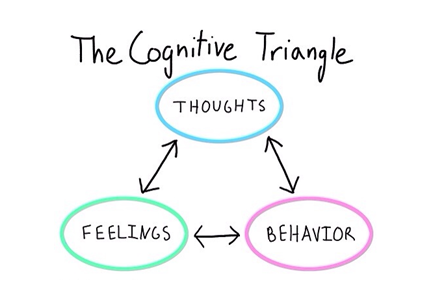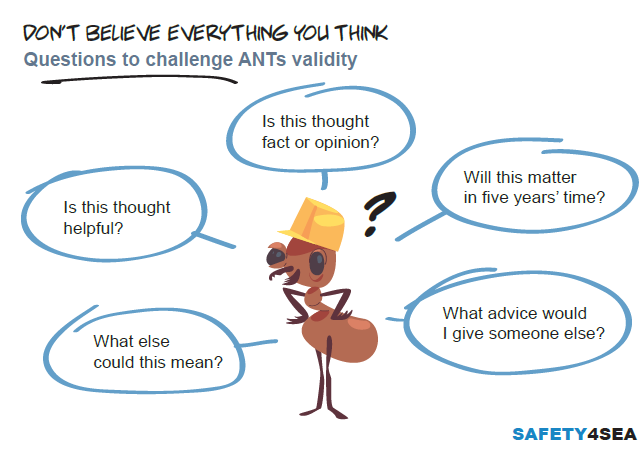“I can’t do much”, “This always happens to me”, “My whole day is ruined”. Do you hear similar “ANTs” buzzing around in your ears, sabotaging your best self? The wide field of ANT (Automatic Negative Thinking) is gaining more and more popularity lately. Having already discussed the “Cognitive Behavior Theory” in previous SAFETY4SEA Issues, it is high time we address where negative thoughts come from and explain the consequences, they bring to both our personal and professional life.
How Automatic Negative Thoughts are harmful
ANTs are cynical, gloomy, and complaining thoughts that just seem to keep coming all by themselves,
…says Dr. Daniel G. Amen, psychiatrist, physician and author.
According to Michigan State University Extension’s Stress Less with Mindfulness program, a person has 80,000 thoughts a day. 90% of these thoughts are repetitive and 80% are negative. Our mental immunity is not able to deny any toxic thoughts, we automatically believe they are real. Negative thoughts can destroy people’s performance and productivity by eroding their confidence and resilience, contributing to missed opportunities for success in several areas of life.
ANTs explained
In the 1960s, one of the founders of cognitive therapy, Aaron Beck, concluded that ANTs create a general mindset (unhappy, anxious or angry) which is likely to generate new ANTs. Some typical ANTs are:
- The “victim” ANT: This is the most harmful ANT and it happens when blaming someone else for our own problems, actions, and attitudes.
- The “can’t” ANT: This ANT is focusing on the negative by dismissing the good.
- The “must” ANT: This ANT is directly linked with words like “should, must, ought or have to. Dr. Amen calls using words like should or have to, “guilt beatings.”
- The “always” ANT: This ANT focuses on words like “always, never, no one, everyone, every time, everything”.
- The “labelmaker” ANT: This ANT attaches labels like fat, lazy, or loser which can become a self-fulfilling prophecy and damage relationships with others.
- The “fortune telling” ANT: It predicts the worst possible outcome to a situation.
- The “nervous” ANT: People often getting nervous over a negative thinking; taking a seemingly innocent event to have a personal, negative meaning.
Obviously, the above ANTS are directly linked with feeling but also behaviors. Negative thoughts can be thought of as a cycle; A situation or experience (activating event) triggers negative thoughts, the so-called beliefs, bringing consequences to our feelings, the emotional result of the beliefs. As a result, they all influence one another (Image 1).

7 techniques to deter negative thoughts
– Change maladaptive thinking with cognitive behavioral therapy
The Cognitive Behavioral Therapy (CBT), focuses on the development of personal coping strategies that target solving current problems and changing unhelpful patterns in cognitions (e.g. thoughts, beliefs, and attitudes), behaviors, and emotional regulation. In this way, CBT helps individuals feel better by targeting their reactions to situations; the basic steps in a cognitive-behavioral assessment include:
- Identify critical behaviors
- Determine whether critical behaviors are excesses or deficits
- Evaluate critical behaviors for frequency, duration, or intensity (obtain a baseline)
- If excess, attempt to decrease frequency, duration, or intensity of behaviors; if deficits, attempt to increase behaviors
– Ask yourself questions like:
Is this thought true? Does having this thought serve me? What’s the alternative of looking at things?What advice would I give someone else who had this thought?
– Plan ahead
List five things you can do on a daily basis that you enjoy. Activity scheduling is a cognitive behavioral therapy exercise that helps people engage in behaviors they ordinarily would not engage in.
– Try to manage your feelings
Make a list of the negative things that control you and manage them. Write them down. How many of them are controllable? Regarding the rest of them ask other friends / family to be there for support.
– Measure your confidence
To think more positively we have to smile often. But the best way to make progress in “squashing ANTs”, is to set a confidence meter. How do you feel today? challenged, fair, steady or strong?
– Practice with what’s the alternative
Mindfulness Meditation helps people disengage from harmful ruminating or obsessing by learning to focus on the “now” and not the past or future. Besides, mindfulness is the subject of a significant amount of new research on effective treatment of psychological issues.
– Turn ANTs into PETs
The so-called PETs are the positive energizing thoughts. Stop feeding your ANTS and focus on non-toxic thoughts. For example, turn the thought “I’ll never get a raise”, into “I have not had a raise in a long time”.
Negative thoughts impact people’s performance and productivity by eroding their confidence and resilience.


Apostolos is a Maritime Safety, Quality & Environmental Expert, Consultant, Trainer and Project Manager with more than a 20-year background in shipping as Technical, Marine, Safety & Training Superintendent and Consultant. He entered the industry back in early 90’s as Engineering Superintendent with a leading ship manager operating a mixed fleet of bulk and oil/chemical tankers. He then shifted to regulatory compliance and QHSE as superintendent and later as a Consultant and Trainer. Apostolos has successfully completed a wide range of QHSE projects including 250+ management system projects (ISM/ISO 9001-14001-18001/TMSA/MLC), 500 vessel and office audits to various standards and he has trained more than 8,000 people in a wide variety of QHSE subjects. He has also presented and chaired to more than 40 conferences. He holds Mechanical Engineering Bachelor and Master’s specialising in Energy & Environment and Master’s Degree in Maritime Business and Business Administration (MBA), all of them awarded with distinction. Apostolos is the Managing Director of SQE MARINE, SQE ACADEMY and Managing Editor of SAFETY4SEA.





























































